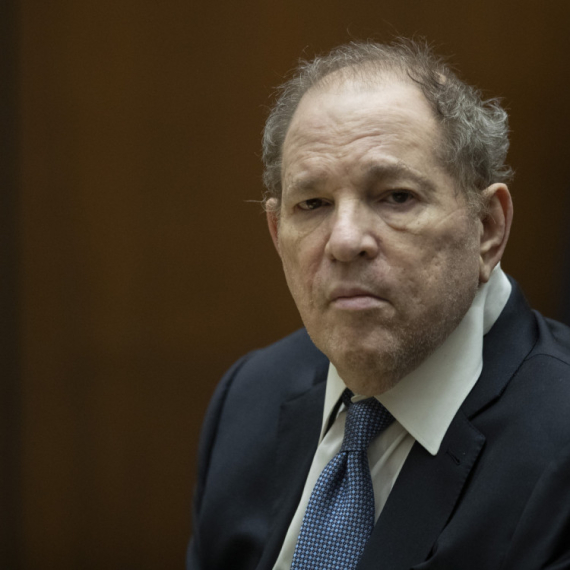Fighting in Tripoli, Beirut calm
Fighting between pro- and anti-government factions jumped to Lebanon's north Monday, but a grim calm hung over the nearly empty streets of Beirut.
Tuesday, 13.05.2008.
09:45

Fighting between pro- and anti-government factions jumped to Lebanon's north Monday, but a grim calm hung over the nearly empty streets of Beirut. As black-clad Shiite militants of Hezbollah carried their latest dead to burial, so did the families and friends of civilians caught in the middle of combat that has routed Sunni factions supporting the Western-allied government from Muslim west Beirut. Fighting in Tripoli, Beirut calm More than 50 people were confirmed dead since fighting erupted Wednesday — first in Beirut, then in the mountains overlooking the city and on Monday in the northern city of Tripoli. It is the worst sectarian violence to wrack Lebanon since a 15-year civil war ended in 1990. That war killed 150,000 people and laid waste to many parts of Beirut, leaving the city divided into ethnic and religious districts deeply suspicious of one another, and the new fighting has torn open old wounds. Beirut remained quiet, and fighting between Druse factions in the mountains outside the city also subsided. But heavy combat was reported in Tripoli, the country's second biggest city. In Tripoli's Bab el-Tabaneh district, about 25 to 30 Sunni fighters armed with AK-47 assault rifles exchanged fire with Alawites in the neighboring Jabal Mohsen area. Alawites are members of a small offshoot of Shiite Islam. The Sunnis, followers of Hariri, moved from one building to another through holes knocked in the walls to avoid snipers. "We shall force them out of here. We won't allow them to stay here," said one fighter, who said he was fighting because Alawites killed his family in the 1980s. Another spoke of the broader national fight. "If the opposition think that they can do here as they did in Beirut they are wrong," he said. The unrest exploded out of a 17-month struggle between the pro-U.S. government and the Hezbollah-led opposition over control of the government. The trigger was the Cabinet's order a week ago that an airport security chief with links to Hezbollah be fired and that the Shiite movement's private telecommunications network be dismantled as a threat to the state. Within days, Hezbollah and its allies swept through Beirut's Muslim sector displacing pro-government gunmen. The national army stood by, with its commanders fearing the military could be torn apart along ethnic and religious lines as it was during the 1975-90 civil war. President Bush issued a statement condemning "Hezbollah's recent efforts, and those of their foreign sponsors in Tehran and Damascus, to use violence and intimidation to bend the government and people of Lebanon to their will." He said the U.S. would stand behind the Western-backed government in Lebanon. "The international community will not allow the Iranian and Syrian regimes, via their proxies, to return Lebanon to foreign domination and control." And in an interview with al-Arabiya television, Bush acknowledged that a planned meeting with Lebanese Prime Minister Fuad Siniora in Egypt as part of his Middle East trip might have to be scrapped, with Siniora under siege.
Fighting in Tripoli, Beirut calm
More than 50 people were confirmed dead since fighting erupted Wednesday — first in Beirut, then in the mountains overlooking the city and on Monday in the northern city of Tripoli. It is the worst sectarian violence to wrack Lebanon since a 15-year civil war ended in 1990.That war killed 150,000 people and laid waste to many parts of Beirut, leaving the city divided into ethnic and religious districts deeply suspicious of one another, and the new fighting has torn open old wounds.
Beirut remained quiet, and fighting between Druse factions in the mountains outside the city also subsided. But heavy combat was reported in Tripoli, the country's second biggest city.
In Tripoli's Bab el-Tabaneh district, about 25 to 30 Sunni fighters armed with AK-47 assault rifles exchanged fire with Alawites in the neighboring Jabal Mohsen area. Alawites are members of a small offshoot of Shiite Islam.
The Sunnis, followers of Hariri, moved from one building to another through holes knocked in the walls to avoid snipers.
"We shall force them out of here. We won't allow them to stay here," said one fighter, who said he was fighting because Alawites killed his family in the 1980s.
Another spoke of the broader national fight. "If the opposition think that they can do here as they did in Beirut they are wrong," he said.
The unrest exploded out of a 17-month struggle between the pro-U.S. government and the Hezbollah-led opposition over control of the government. The trigger was the Cabinet's order a week ago that an airport security chief with links to Hezbollah be fired and that the Shiite movement's private telecommunications network be dismantled as a threat to the state.
Within days, Hezbollah and its allies swept through Beirut's Muslim sector displacing pro-government gunmen. The national army stood by, with its commanders fearing the military could be torn apart along ethnic and religious lines as it was during the 1975-90 civil war.
President Bush issued a statement condemning "Hezbollah's recent efforts, and those of their foreign sponsors in Tehran and Damascus, to use violence and intimidation to bend the government and people of Lebanon to their will."
He said the U.S. would stand behind the Western-backed government in Lebanon. "The international community will not allow the Iranian and Syrian regimes, via their proxies, to return Lebanon to foreign domination and control."
And in an interview with al-Arabiya television, Bush acknowledged that a planned meeting with Lebanese Prime Minister Fuad Siniora in Egypt as part of his Middle East trip might have to be scrapped, with Siniora under siege.








































Komentari 0